|
|
|
Sort Order |
|
|
|
Items / Page
|
|
|
|
|
|
|
| Srl | Item |
| 1 |
ID:
175148
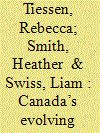

|
|
|
|
|
| Summary/Abstract |
This essay introduces a collection of articles on the lessons that can be drawn from Canada’s Feminist International Assistance Policy (FIAP) as Canada moves toward a more concrete and deliberate approach to feminist foreign policy. The articles in this collection provide insights into the challenges to be addressed, gaps to be filled, and the critical analyses necessary for expanding and enhancing Canada’s feminist foreign policy. The aim of the collection is to show that lessons learned from the FIAP can inform the design of Canada’s next steps in forging a formalized, comprehensive, and coherent feminist foreign policy. This introductory essay summarizes the five articles in this special section of International Journal on the FIAP and Canada’s feminist foreign policy and highlights their key findings.
|
|
|
|
|
|
|
|
|
|
|
|
|
|
|
|
| 2 |
ID:
175153
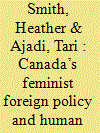

|
|
|
|
|
| Summary/Abstract |
Canadian federal governments regularly try to craft a unique image of Canada in the world; however, the Trudeau government’s embrace of feminist foreign policy feels strikingly similar to the late 1990s when human security was embraced. There seems to be a “sameness” in the promotion of a progressive values-based discourse that has transformative potential for Canadian foreign policy. The question is, does this sense of sameness bear out when we dig into the comparison? Drawing on speeches given by government ministers; policy documents, such as the Feminist International Assistance Policy (FIAP); media; and scholarship, we compare and contrast analyses of the sources of the human security and feminist foreign policy discourses and then identify common critiques. We also examine two significant differences. We find there is consistent Liberal articulation of values-based discourses and policies that have unmet transformative potential. In both cases, style and rhetoric are privileged over transformative change.
|
|
|
|
|
|
|
|
|
|
|
|
|
|
|
|
| 3 |
ID:
193149
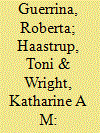

|
|
|
|
|
| Summary/Abstract |
Since 2014, several European Union (EU) member states have adopted their own versions of “Feminist Foreign Policy” (FFP). Increasingly, feminist bureaucrats, politicians, activists and scholars are calling for the EU to do the same. This article scrutinises claims to the feminist actorsness of the EU by introducing the analytical concept of Feminist Power Europe (FPE). In employing FPE the article examines whether the EU can adopt a FFP that upholds transformative potential of feminism. Undertaking critical content analysis of key documents, we identify three overarching feminist frames that emerge in the EU’s external policies: (1) Liberal; (2) Intersectional; (3) Postcolonial. We demonstrate that the EU’s propensity for a transformative feminist foreign policy is limited by the setup of global politics and the main drivers of European integration, which continue to be situated in a traditionally masculine environment and are defined by prevailing hierarchies. In undertaking this work, we highlight the constraints of advocating for the EU to adopt a FFP. This paper concludes by cautioning against the uncritical deployment of “feminism” in foreign policy articulation within an FPE configuration that excludes reflexivity about the EU’s external relations vision and indeed, its practice.
|
|
|
|
|
|
|
|
|
|
|
|
|
|
|
|
| 4 |
ID:
183708
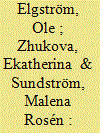

|
|
|
|
|
| Summary/Abstract |
Drawing on the IR theories of norm translation and strategic narratives, this article focuses on how states translate international norms to their own advantage by producing strategic narratives to advance their soft power ambitions abroad. Using the example of feminist foreign policy (FFP), the article compares Sweden, Canada, France, and Mexico in their attempts to translate international feminist norms into their countries’ strategic narratives. This comparison is based on three strategic narrative types (issue, national, and international system narratives) and two types of feminism (liberal, intersectional). Issue narratives reveal that Sweden and Mexico give more priority to social policies, while France and Canada emphasise the role of the market in addressing gender inequality. International system narratives demonstrate that Sweden and Mexico perceive global challenges as drivers of gender inequality, while France and Canada see gender inequality as a cause of global problems. National narratives show that Sweden and Mexico refer to other FFP countries to ‘back up’ their feminist initiatives, while France and Canada do not relate to other states. Finally, while liberal feminism dominates all four FFPs, each state either prioritises particular aspects of it (legal, market, security, rights-based) or incorporates elements from intersectional feminism.
|
|
|
|
|
|
|
|
|
|
|
|
|
|
|
|
| 5 |
ID:
169628
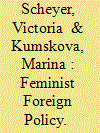

|
|
|
| 6 |
ID:
184042
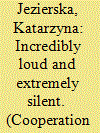

|
|
|
|
|
| Summary/Abstract |
In 2014, Sweden’s Feminist Foreign Policy (FFP) was announced with a fanfare. This article critically interrogates how Sweden implements the FFP through digital diplomacy by investigating the extent of Sweden’s gender equality activities on Twitter since the introduction of the FFP and by tracing gendered online abuse in digital diplomacy. I focus on Swedish embassy tweets towards two countries where feminism is highly contested – Poland and Hungary. The theoretical inspiration comes from discursive approaches to the spoken and unspoken, enriched by feminist observations about the non-binary character of voice/silence. The method applied is gender-driven quantitative and qualitative content analysis. The findings demonstrate that the FFP has not set any significant mark on digital diplomacy in the analyzed cases. The launching of the FFP went completely unnoticed and posts related to gender equality have actually decreased since 2014. There are no traces of ambassadors being subjected to gendered online abuse, but heavily xenophobic and paternalistic language is directed at Sweden as a representative of liberal policies. The article contributes to the literature on digital diplomacy by highlighting the (lack of) links between foreign policy and digital diplomacy and it addresses a gap by focusing on gender in digital diplomacy.
|
|
|
|
|
|
|
|
|
|
|
|
|
|
|
|
| 7 |
ID:
167215
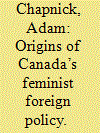

|
|
|
|
|
| Summary/Abstract |
In January 2019, a leading Canadian foreign policy blog, OpenCanada.org, declared that “[u]nder the government of Justin Trudeau, Canada has embraced a feminist foreign policy—gradually at first, and with fervor over the past year.” Although critics have debated the policy’s effectiveness, the embrace, if not also the fervor, was indisputable. By 2019, the Trudeau government’s second foreign minister, Chrystia Freeland, was proclaiming Canada’s feminist approach to international relations openly and regularly. The international community had also noticed. This article investigates the origins of the new Canadian foreign policy “brand.” It finds that, contrary to popular thinking, the prime minister himself played at most a minor role in the initiation of what became a full-fledged transformation of Canada’s global image.
|
|
|
|
|
|
|
|
|
|
|
|
|
|
|
|
| 8 |
ID:
164833
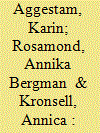

|
|
|
|
|
| Summary/Abstract |
A growing number of states including Canada, Norway and Sweden have adopted gender and feminist-informed approaches to their foreign and security policies. The overarching aim of this article is to advance a theoretical framework that can enable a thoroughgoing study of these developments. Through a feminist lens, we theorise feminist foreign policy arguing that it is, to all intents and purposes, ethical and argue that existing studies of ethical foreign policy and international conduct are by and large gender-blind. We draw upon feminist International Relations (IR) theory and the ethics of care to theorise feminist foreign policy and to advance an ethical framework that builds on a relational ontology, which embraces the stories and lived experiences of women and other marginalised groups at the receiving end of foreign policy conduct. By way of conclusion, the article highlights the novel features of the emergent framework and investigates in what ways it might be useful for future analyses of feminist foreign policy. Moreover, we discuss its potential to generate new forms of theoretical insight, empirical knowledge and policy relevance for the refinement of feminist foreign policy practice.
|
|
|
|
|
|
|
|
|
|
|
|
|
|
|
|
| 9 |
ID:
175151
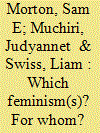

|
|
|
|
|
| Summary/Abstract |
The Government of Canada introduced its new Feminist International Assistance Policy (FIAP) to guide its foreign aid programming in June 2017. This feminist turn mirrors earlier adoptions of feminist aid and foreign policy by Sweden and echoes the current Canadian government’s feminist rhetoric. This paper examines the FIAP and its Action Areas Policies to ask what kind(s) of feminism are reflected in the policy and what groups of people it prioritizes. The paper examines the values, goals, and gaps of the policy in order to understand what feminist values and goals are being operationalized and pursued and what gaps and contradictions exist. By examining the FIAP’s Action Area Policies using a discourse network analysis of the groups represented in the policies, we demonstrate the failings of the FIAP to incorporate an intersectional approach. Our results show that the FIAP adopts a mainstream liberal feminism that excludes many peoples and groups from the core of Canada’s aid efforts.
|
|
|
|
|
|
|
|
|
|
|
|
|
|
|
|
|
|
|
|
|